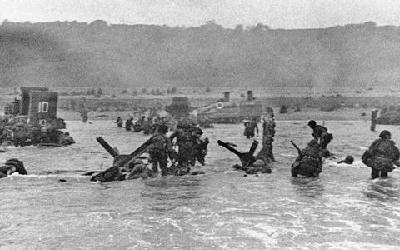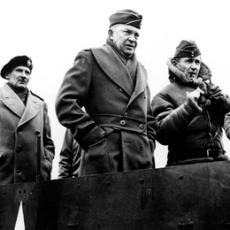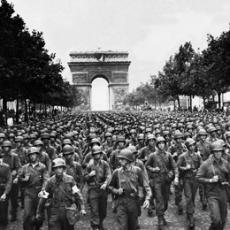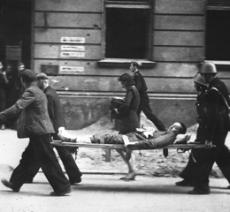
STEVE EMBER: Welcome to THE MAKING OF A NATION -- American history in VOA Special English. I'm Steve Ember.
(MUSIC)
On June 5th, 1944, a huge Allied force waited for the order to invade German-occupied France. The invasion had been planned for the day before. But a storm forced a delay.
At 3:30 in the morning, the Allied commander, General Dwight Eisenhower, was meeting with his aides. The storm still blew outside the building.
General Eisenhower and the other generals were discussing whether they should attack the next day.
A weatherman entered the room. He reported that the weather would soon improve. All eyes turned toward Eisenhower. The decision was his. His face was serious. And for a long time he was silent. Finally he spoke. "Okay," he said. "We will go."
And so the largest military invasion ever known, D-Day, took place on June 6th, 1944.
(MUSIC)
The German leader, Adolph Hitler, had known the invasion was coming. But he did not know where the Allied force would strike.
Most Germans expected the Allies would attack at Calais. But they were wrong. Eisenhower planned to strike along the French coast of Normandy, across the English Channel.
The Second World War was then almost five years old. The Germans had won the early battles and gained control of most of Europe. But in 1942 and 1943, the Allies slowly began to gain back land from the Germans in North Africa, Italy and Russia. And now, finally, the British, American, Canadian and other Allied forces felt strong enough to attack across the English Channel.

Eisenhower had 150,000 men and 12,000 planes for the attack. But most importantly, he had surprise on his side. Even after the invasion began, General Erwin Rommel and other German military leaders could not believe that the Allies had really attacked at Normandy.
But attack they did. On the night of June 5th, thousands of Allied soldiers parachuted behind German lines. Then Allied planes began dropping bombs on German defenses. And in the morning, thousands of ships approached the beaches, carrying men and supplies.
The battle quickly became fierce and bloody. The Germans had strong defenses. They were better protected than the Allied troops on the beaches. But the Allied soldiers had greater numbers. Slowly they moved forward on one part of the coast, then another.
(MUSIC)
DWIGHT EISENHOWER: "People of Western Europe: a landing was made this morning on the coast of France by troops of the Allied Expeditionary Force."
STEVE EMBER: General Dwight Eisenhower.
DWIGHT EISENHOWER: "This landing is part of a concerted United Nations plan for the liberation of Europe. I have this message for all of you: Although the initial assault may not have been made in your own country, the hour of your liberation is approaching. All patriots -- men and women, young and old -- have a part to play in the achievement of final victory.
"To members of resistance movements, whether led by nationals or by outside leaders, I say: Follow the instructions you have received. To patriots who are not members of organized resistance groups, I say: Continue your passive resistance, but do not needlessly endanger your lives. Wait until I give you the signal to rise and strike the enemy."
STEVE EMBER: The Allies continued to build up their forces in France. Within one week they brought nearly 90,000 vehicles and 600,000 men into France. And they pushed ahead.
Hitler was furious. He screamed at his generals for not blocking the invasion. And he ordered his troops from nearby areas to join the fight and stop the Allied force. But the Allies would not be stopped.
(MUSIC)
In late August, the Allied forces liberated Paris from the Germans. People cheered wildly as General Charles de Gaulle and Free French troops marched into the center of the city.

The Allies then moved east into Belgium. They captured the port of Antwerp. This made it easier for them to send supplies and fuel to their troops.
Only when Allied troops tried to move into the Netherlands did the Germans succeed in stopping them. American forces won battles at Eindhoven and Nijmegen. But German forces defeated British "Red Devil" troops in a terrible fight at Arnhem.
Germany's brief victory stopped the Allied invasion for the moment. But in less than four months, General Eisenhower and the Allied forces had regained almost all of France.
At the same time, in 1944, the Soviets were attacking Germany from the east. Earlier, Soviet forces had succeeded in breaking German attacks at Stalingrad, Moscow and Leningrad. Soviet forces recaptured Russian cities and farms one by one. They entered Finland, Poland, and Romania. By the end of July, Soviet soldiers were just 15 kilometers from the Polish capital, Warsaw.
What happened next was one of the most terrible events of the war. Moscow radio called on the people of Poland to rise up against the German occupation forces. Nearly 40,000 men in the Polish underground army listened to the call. And they attacked the Germans. The citizens of Warsaw probably could have defeated the German occupation forces if the Soviet army had helped them.

But Soviet leader Josef Stalin betrayed the Poles. He knew that many members of the Polish underground forces opposed Communism as much as they opposed the Germans. He feared they would block his efforts to establish a new Polish government that was friendly to Moscow.
For this reason, Stalin held his forces outside Warsaw. He waited while the Germans and Poles killed each other in great numbers. The Germans finally forced the citizens of Warsaw to surrender.
The real winner of the battle, however, was the Soviet Union. Both the Germans and the Poles suffered heavy losses during the fighting. The Soviet Army had little trouble taking over the city with the help of Polish Communists. And after the war, the free Polish forces were too weak to oppose a Communist government loyal to Moscow.
(SOUND: Adolf Hitler)
Adolf Hitler was in serious trouble. Allied forces were attacking from the west. Soviet troops were passing through Poland and moving in from the east. And at home, several German military officials tried to assassinate him. The German leader narrowly escaped death when a bomb exploded in a meeting room.
But Hitler refused to surrender. Instead, he planned a surprise attack in December 1944. He ordered his forces to move quietly through the Ardennes Forest and attack the center of the Allied line. He hoped to break through the line, separate the Allied forces, and regain control of the war.
The Germans attacked American troops tired from recent fighting in another battle. It was winter. The weather was so bad that Allied planes could not drop bombs on the German forces. The Germans quickly broke through the American line.
But the German success did not last long. Allied forces from nearby areas raced to the battle front to help. And good weather allowed Allied planes to begin attacking the Germans.
The battle ended by the middle of the following month in a great defeat for Hitler and the Germans. The German army lost more than 100,000 men and great amounts of supplies.
The end of the war in Europe was now in sight. By late February, 1945, the Germans were forced to retreat across the Rhine River.
American forces led by General George Patton drove deep into the German heartland.
To the east, Soviet forces also were marching into Germany. It did not take long for the American and Soviet forces to meet in victory. The war in Europe was ending.
Adolf Hitler waited until Russian troops were destroying Berlin. Bombs and shells were falling everywhere. In his underground bunker, Hitler took his own life by shooting himself in the head. Several of his closest aides also chose to die in the "Fuhrerbunker."
(MUSIC)
One week later, the German army surrendered to Eisenhower and the Allies.
WINSTON CHURCHILL: "Yesterday morning at 2:41 a.m. at General Eisenhower's headquarters, General Jodl, the representative of the German High Command and of Grand Admiral Doenitz, the designated head of the German state, signed the act of unconditional surrender of all German land, sea and air forces in Europe to the Allied Expeditionary Forces, and simultaneously to the Soviet High Command."
STEVE EMBER: British Prime Minister Winston Churchill.
WINSTON CHURCHILL: "Hostilities will end officially at one minute after midnight tonight, Tuesday, the 8th of May. We may allow ourselves a brief period of rejoicing. Today is Victory in Europe Day. Long live the cause of freedom."
STEVE EMBER: The defeat of Germany was cause for great celebration in Britain, the United States and other Allied nations. But two facts made the celebrations less joyful than they might have been.
(MUSIC)
One was the discovery by Allied troops of the German death camps. Only at the end of the war did most of the world learn that the Nazis had murdered millions of innocent Jews and other people.
The second fact was that the Pacific War had not ended. Japanese and American forces were still fighting bitterly. The war in the Pacific will be our story next week.
Our program was written by David Jarmul. You can find our series online with transcripts, MP3s, podcasts and pictures at voaspecialenglish.com. You can also follow us on Facebook and Twitter at VOA Learning English. I'm Steve Ember, inviting you to join us again next week for THE MAKING OF A NATION -- American history in VOA Special English.
Fuhrerbunker: 希特勒地堡
American history: German forces defeated in Russia and Britain
American history: US declares war on Japan, Germany and Italy
America history: US-Japan relations before World War Two
American history: Japanese attack on Pearl Harbor pulls US into war
(來源:VOA 編輯:崔旭燕)
